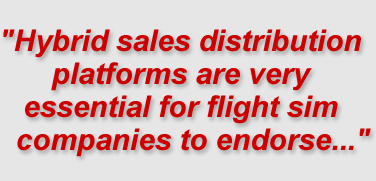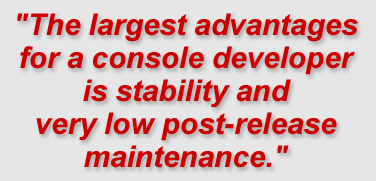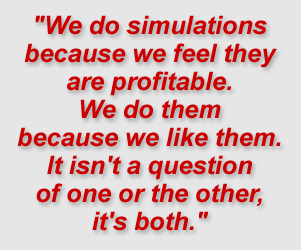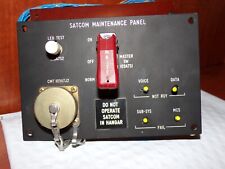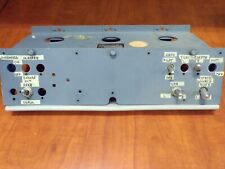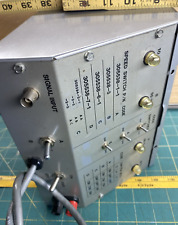After the 2005 E3Expo we ran a series of discussions (linked on our homepage) on The Future of Simulations where we asked the SimHQ Staff for their thoughts on the state of the simulations industry. We’ll now follow-up those discussions from the developers point of view. As a reference, you should also read this SimHQ 2000 two-part interview series available in .pdf here and here to see the PC simulation industry’s leaders point-of-view from five years ago.
Our Panel of Participants
| Martin van Balkom President Battlefront.comAl Delaney Founder, President and Lead Programmer eSim Games, LLCSteve Grammont Co-founder Battlefront.comDavid Heath Director of Operations, Public Relations and Acquisitions Matrix Games |
Nils “Ssnake” Hinrichsen Marketing & Sales Director eSim Games, LLCRick “Rjetster” Ladomade Vice President, Treasury Xtreme Simulations International, LLCJulian “Buckshot” Leonard Vice President, Engineering Xtreme Simulations International, LLCChris “C3PO” Partridge Publicity & Marketing Lead Pursuit, LLC |
The Discussion Continues…
SimHQ: Is the multiplayer or single player aspect of a sim more important, or do they share equally in the success of a product? How would you rate the importance of multiplayer in the success of a new release?
Chris (Lead Pursuit): One word: vital. Look at the biggest successes of the last few years and see how prominently multiplayer has been positioned in those releases. MMOG et al. I’ve been playing Battlefield 2 online for the last two months and it has had me hooked. It is vital because it appeals to that base sense of humanity: the urge to interact with other humans. Even geeks cannot escape instinct.
Rick (XSI): Well for the high fidelity flight sim market, I believe it’s absolutely crucial for developers to embrace both aspects of the single-player and multiplayer modes, including co-op and head-to-head. Again, it really depends on what your targeted markets desires are, and how big of an audience you are willing to indulge. The future of gaming as we know it will highly depend on the multiplayer features and characteristics.
 Julian (XSI): I believe multiplayer is extremely important. As I touched on in the answer to my first question, I believe that the multiplayer community is much bigger than many give credit for. Internet usage is expanding at such an incredible rate that data from as late as a year ago is going to be of questionable value, if it’s 3, 4 years or more old then it’s worse than useless. More importantly though there is no question that multiplayer gaming is the future, even the consoles are taking that route. Once more and more consumers are exposed to the advantages of the multiplayer environment growth in that area will continue to skyrocket.
Julian (XSI): I believe multiplayer is extremely important. As I touched on in the answer to my first question, I believe that the multiplayer community is much bigger than many give credit for. Internet usage is expanding at such an incredible rate that data from as late as a year ago is going to be of questionable value, if it’s 3, 4 years or more old then it’s worse than useless. More importantly though there is no question that multiplayer gaming is the future, even the consoles are taking that route. Once more and more consumers are exposed to the advantages of the multiplayer environment growth in that area will continue to skyrocket.
Nils (eSim Games): You can’t do without solid multiplayer, but few titles could sell well without a strong single-player element either.
Martin (Battlefront): From our experience, multiplayer is a very important feature nowadays. No AI is going to fully replace a human player and the thrill and excitement of matching your skills against others. That’s why we place an especially high importance on features like multiplayer and multi-crew in our current and future sims.
David (Matrix Games): I would say it works a little like this: Single player aspect is what sells the game, multiplayer is what keeps people playing. If you leave out one the game will not live up to its full potential. In a new release single player is much more important, as that will sell copies. However, if your goal is to build a long standing brand through sequels or sell expansions, multiplayer ends up being just as important. I would say the importance is 60/40 single-multiplayer.
SimHQ: Has the Internet explosion made it possible to work on a flight simulation product without having a single physical development location? Are places like Hunt Valley, MD a thing of the past or is it still important to be centrally located?
Chris (Lead Pursuit): Most definitely. Our developers are spread across the USA, Canada, UK, Croatia, the Netherlands, Germany, Austria and Switzerland. We’ve had one big collective meeting in our time as a company (and we’re planning another soon!), but otherwise interaction is purely through the Internet. Clearly, that has positive and negative sides: positive in that you can harness a much greater talent pool, negative in that communication mostly involves typing. Roll on the mind chip.
David (Matrix Games): As I understand it, the Internet certainly has added a great deal of flexibility to all members of development and publishing. What I am hearing as common place is the removal of central offices and weekly meetings during the normal life cycle. This means that to gain the most benefit from this freedom developers should still live within a reasonable distance from each other. Physical contact increases productivity a great deal but having coworkers or bosses looming over your shoulder does not. This model takes advantage of both. Of course, come crunch time those weekly meetings turn into daily sleepovers.
Julian (XSI): Running a dispersed development group with no fixed “office” I can certainly understand there are many advantages and disadvantages to each approach. Being dispersed does bring a number of challenges, however with the current technologies just about all of these are able to be overcome to a large degree. Being able to tap into some of the skilled people we have managed to gather at XSI has been a huge benefit to us. Many of those people would not have been available to us had they been required to relocate to a central location. I think overall with all things considered the “virtual office” has been more of a positive for us than a single location.
Rick (XSI): I believe the Internet market has unquestionably made an enormous difference in how we develop flight sims. It’s not only within reach of the flight sim market, but experienced and practiced all over the world with incredible success as we speak. We watch it every single day with smaller third party flight sim developers, and many are having tremendous success. There is no reason why companies managed properly can’t take advantage of this new and insightful technology. I am not advocating that it is a painless process, but at least the opportunity exists for many of the newer companies.
Nils (eSim Games): In the case of eSim Games, it indeed works very well. In essence we’re a network of home offices. There are benefits and drawbacks. The most obvious drawback is, you can’t go into the office next door and show on the screen what’s wrong, or ask for advice. On the other hand, we’re working at minimal costs, and we can — at least potentially — pick from a worldwide pool of artists to contribute to the project. Not only can we pick great talent, but also talent with love and enthusiasm for the subject matter. And it shows in their work results, as you will see.
Having said that — I don’t think that either model is inherently superior. Having at least a core team in one location definitely is a good thing to have, but so far we managed to do without. There is no “one size fits all” answer to the best form of organizing a game development team.
Martin (Battlefront): Battlefront.com is a happy virtual company ever since Steve and Charles founded it more than 6 years ago. All of us work independently out of their homes on three continents (North America, Europe and Australia), both on publishing as well as developing games. Needless to say that the “lack” of a brick’n mortar office is reducing our fixed overhead tremendously. What it takes though are great independent and skilled workers like those that we have.




